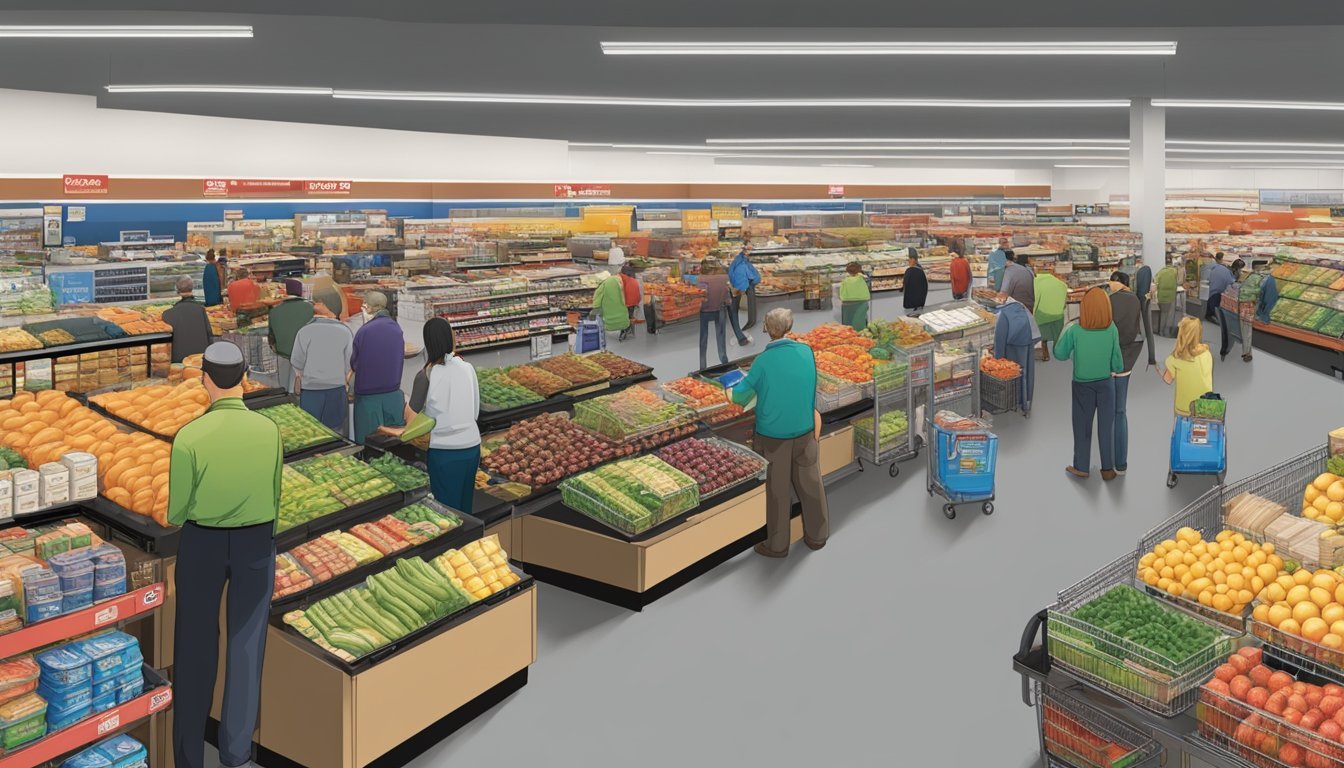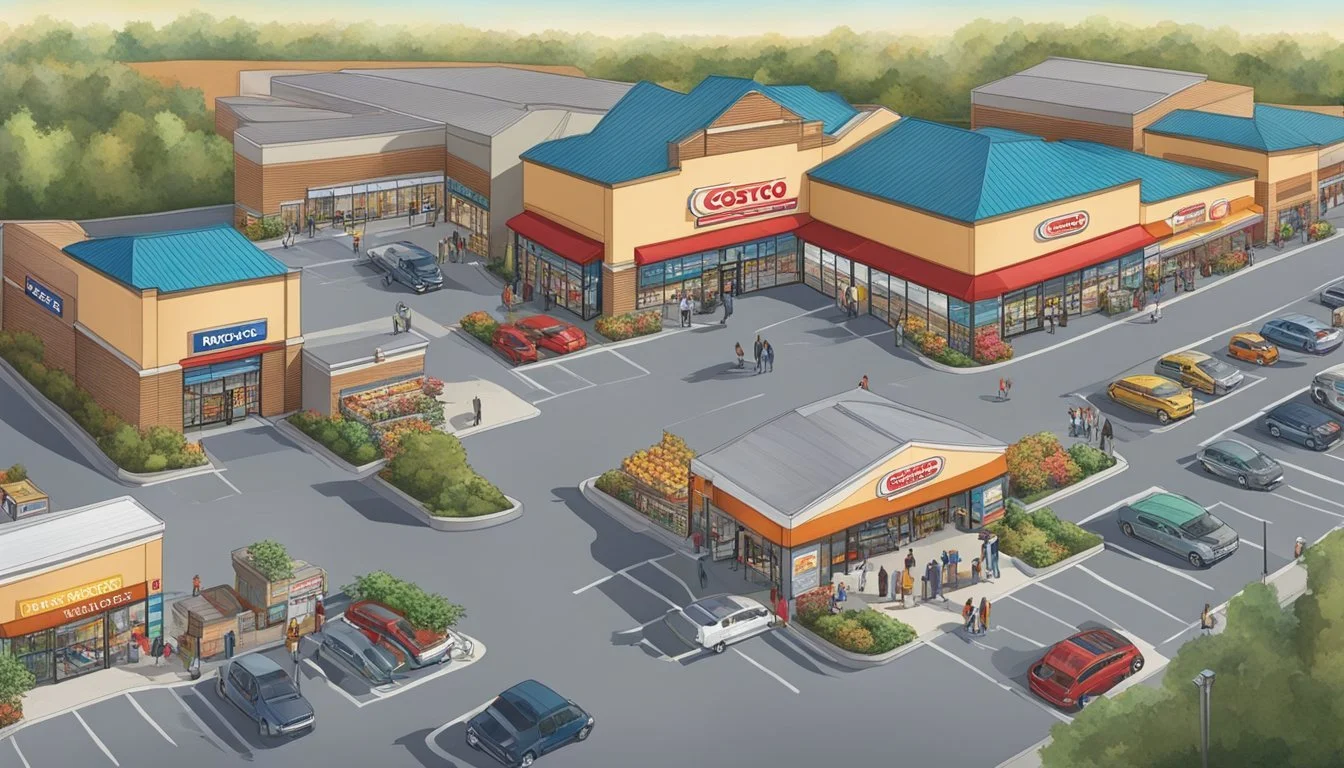Costco vs WinCo Foods
A Comprehensive Price and Quality Comparison
Costco and WinCo Foods are two popular grocery chains known for their competitive prices and diverse product offerings. Both stores have loyal customer bases, but they differ in their business models and shopping experiences.
WinCo Foods generally offers slightly lower prices per unit compared to Costco, making it potentially more cost-effective for everyday grocery shopping. However, Costco provides a wider range of services and non-grocery items, which may appeal to customers looking for a one-stop shopping destination.
While WinCo boasts a larger variety of grocery products, Costco's bulk buying options can be advantageous for families or those who prefer to stock up. The choice between these two retailers often comes down to individual shopping preferences, frequency of visits, and specific household needs.
Company Profiles
Costco and WinCo Foods are two prominent grocery retailers with distinct histories and business models. Both companies have grown significantly since their inception, but they've taken different paths to success.
History of Costco
Costco's story began in 1976 when Sol Price opened the first Price Club warehouse in San Diego. In 1983, James Sinegal and Jeffrey Brotman founded Costco Wholesale Corporation in Seattle. The two companies merged in 1993, becoming PriceCostco.
In 1997, the company rebranded as Costco Wholesale Corporation. Costco quickly expanded across the United States and internationally. The company is known for its membership model, bulk sales, and diverse product offerings.
Costco's commitment to quality and value has earned it a loyal customer base. The company offers a wide range of products, from groceries to electronics and even travel services.
History of WinCo Foods
WinCo Foods traces its roots to 1967 when Ralph Ward and Bud Williams opened a discount warehouse grocery store in Boise, Idaho. Originally named Waremart, the company changed its name to WinCo Foods in 1999.
WinCo stands out as an employee-owned company, with over 20,000 employee-owners. This structure allows WinCo to keep costs low and pass savings to customers.
The company has focused its growth primarily in the Western United States. WinCo is known for its no-frills approach, with customers bagging their own groceries and a basic store setup.
WinCo's business model emphasizes direct purchasing from farms and factories, further reducing costs. The company offers a wide range of grocery products, health and beauty items, and household supplies.
Membership and Payment Options
Costco and WinCo Foods differ significantly in their membership requirements and accepted payment methods. These factors can impact shoppers' decisions on where to purchase groceries.
Costco Membership Fees
Costco operates on a membership-based model. The basic Gold Star membership costs $60 annually, while the Executive membership is priced at $120 per year. Executive members receive additional benefits, including 2% cash back on eligible Costco purchases.
To make the Executive membership worthwhile, customers need to spend around $500 monthly at Costco. The membership fee grants access to all Costco locations and their online store.
For payment, Costco accepts Visa credit cards, debit cards, cash, checks, and EBT cards. They do not accept other credit card brands in-store, which can be inconvenient for some shoppers.
WinCo Foods Payment Methods
WinCo Foods does not require a membership to shop at their stores. This allows customers to access their low prices without any upfront costs or annual fees.
WinCo accepts various payment methods, including:
Cash
Debit cards
Checks
EBT cards
WIC (Women, Infants, and Children) vouchers
Notably, WinCo does not accept credit cards in most locations. They avoid credit card transaction fees, which helps keep their prices low. However, this policy may inconvenience customers who prefer to use credit cards for grocery purchases.
Some WinCo stores have started accepting Apple Pay and other mobile payment options, expanding their payment flexibility.
Store Policies and Customer Experience
Costco and WinCo Foods employ distinct approaches to serving their customers. These differences significantly impact the shopping experience and cater to varying consumer preferences.
Costco Buying in Bulk
Costco's business model revolves around bulk purchasing. Members can buy large quantities of products at discounted prices. This approach suits families, businesses, and those who prefer stocking up.
Costco stores are open for extended hours, typically from 10 AM to 8:30 PM on weekdays. Weekend hours may vary. While not open 24/7, these hours accommodate most shoppers' schedules.
The warehouse-style layout offers a wide selection of products beyond groceries. Customers find electronics, clothing, and even travel services under one roof.
Costco's membership program provides additional benefits. These include access to exclusive deals and the option to use Costco's gas stations, which often offer lower prices than competitors.
WinCo Foods Self-Service Model
WinCo Foods operates on a self-service model. This approach keeps costs down and allows for competitive pricing.
Customers bag their own groceries at WinCo. While this may require more effort, it contributes to lower overall prices.
Many WinCo stores are open 24 hours a day, 7 days a week. This schedule provides unparalleled convenience for shoppers with non-traditional work hours or busy schedules.
WinCo's layout focuses primarily on groceries and household essentials. The stores feature a large bulk foods section where customers can purchase exactly the amount they need.
Unlike Costco, WinCo doesn't require a membership. This allows for more flexibility and accessibility for all shoppers.
Price Comparison and Affordability
Costco and WinCo Foods employ different pricing strategies to attract budget-conscious shoppers. Both stores offer competitive prices, but their approaches vary in terms of bulk purchases, membership requirements, and product selection.
Costco Price Structure
Costco's pricing model revolves around bulk purchases and a membership program. The warehouse club offers significant discounts on large quantities, making it attractive for families and businesses. Costco's annual membership fee ($60 for Gold Star, $120 for Executive) grants access to these deals.
Costco's prices are typically 12-30% below average supermarket prices. The store focuses on a limited selection of high-quality items, often featuring name brands at discounted rates. Bulk pricing can lead to lower per-unit costs, but requires more upfront spending.
Costco accepts Visa credit cards, offering convenience for members who prefer credit purchases.
WinCo Foods Low Prices Commitment
WinCo Foods positions itself as a no-frills, low-price leader in the grocery market. The employee-owned company operates on thin profit margins to keep prices low. WinCo's prices are often slightly lower than Costco's on a per-unit basis.
WinCo achieves these low prices through cost-cutting measures:
No membership fees
Limited advertising
Bulk bin options for dry goods
Store brand products
WinCo offers a wider variety of products than Costco, including more traditional grocery items. This allows for easier meal planning and smaller purchases. The store accepts debit cards and cash but does not take credit cards, which helps keep costs down.
WinCo's commitment to low prices makes it an excellent option for budget-conscious shoppers seeking everyday low prices without a membership requirement.
Product Range and Quality
Costco and WinCo Foods offer distinct product selections and quality levels to meet different consumer needs. Both stores provide a variety of groceries, household items, and everyday essentials.
Costco Product Offerings
Costco focuses on bulk quantities and premium brands. Their produce section features high-quality fruits and vegetables, often in larger packages. Meat options include prime cuts and organic choices. Costco's bakery offers fresh bread, pastries, and cakes.
The store's Kirkland Signature brand covers a wide range of products, from groceries to household items. Costco also carries a rotating selection of non-grocery items like electronics, clothing, and furniture.
Bulk items are a Costco specialty, with large packages of pantry staples, snacks, and toiletries. The store's selection of health and beauty products includes both name brands and Kirkland alternatives.
WinCo Foods Merchandise Selection
WinCo Foods provides a more traditional grocery store experience with a focus on variety and low prices. Their produce section offers a wide range of fruits and vegetables in smaller quantities suitable for individual shoppers or families.
The store's meat department features both pre-packaged and fresh-cut options. WinCo's bakery produces fresh bread and pastries daily. Store brand items are available across multiple categories, offering budget-friendly alternatives.
WinCo is known for its extensive bulk foods section, where customers can purchase exact amounts of grains, nuts, spices, and candies. The store stocks a comprehensive selection of grocery products, household items, and pet supplies.
Health and beauty products at WinCo include both name brands and generic options. The store's toiletries section covers everyday essentials at competitive prices.
Shopping Convenience and Accessibility
Costco and WinCo Foods offer distinct shopping experiences, each with its own advantages in terms of convenience and accessibility. Their approaches to store layout, operating hours, and locations cater to different customer needs and preferences.
Store Layout and Design
Costco's warehouses feature wide aisles and a spacious layout. Products are often displayed on pallets or in bulk packaging. This design allows for efficient restocking and easy navigation for customers with carts.
WinCo stores have a more traditional supermarket layout. Aisles are organized by product categories, making it easier to find specific items. The stores typically include a bulk foods section where customers can purchase items in custom quantities.
Both chains prioritize efficiency, but WinCo's layout may be more familiar to shoppers accustomed to conventional grocery stores.
Operating Hours and Locations
Costco operates in 10 states across the Western U.S. and beyond. Its warehouses generally have limited hours, often closing earlier in the evening. This can be less convenient for shoppers with non-traditional schedules.
WinCo Foods focuses primarily on the Western U.S. Their stores are typically open 24 hours a day, 7 days a week. This round-the-clock availability provides greater flexibility for customers with varying work schedules or shopping preferences.
WinCo's more extensive hours give it an edge in terms of accessibility. However, Costco's wider geographic reach may make it more convenient for shoppers in certain regions.
Promotions and Savings
Both Costco and WinCo Foods offer unique ways for shoppers to save money on groceries and household items. Their different approaches to promotions and pricing strategies can significantly impact a customer's overall shopping experience and budget.
Special Deals at Costco
Costco provides various opportunities for members to save money. The warehouse club offers limited-time "Hot Buys" and "Member-Only Savings" on select items throughout the store. These deals typically last for about a month and can provide substantial discounts on popular products.
Costco's Executive Membership includes a 2% cash back reward on eligible purchases, which can add up to significant savings for frequent shoppers. The company also offers a co-branded credit card that provides additional cash back on Costco purchases and other categories like gas and travel.
While Costco doesn't accept manufacturer coupons, they occasionally provide their own coupons in their monthly savings booklet. These coupons offer instant savings on specific items without the need to clip or present physical coupons at checkout.
WinCo Foods Pricing Strategies
WinCo Foods takes a different approach to savings, focusing on consistently low prices rather than temporary promotions. The store's employee-owned model and no-frills shopping experience contribute to their ability to keep prices low across the board.
WinCo is known for its bulk foods section, where customers can purchase exactly the amount they need at competitive prices. This approach helps reduce packaging costs and allows shoppers to save money by buying only what they require.
The store rarely advertises or offers special deals, instead maintaining everyday low prices. WinCo doesn't have a loyalty program or offer cash back rewards, but their pricing strategy aims to provide savings on every shopping trip without the need for promotional gimmicks.
WinCo accepts manufacturer coupons, allowing customers to stack additional savings on top of their already low prices. This policy can lead to even greater discounts for savvy shoppers who take the time to collect and use coupons.
Retail Ecosystem Comparison
Costco and WinCo Foods occupy distinct positions in the retail grocery landscape. Each caters to different consumer needs and employs unique business models to deliver value.
Costco in the Retail Market
Costco operates as a membership-based warehouse club, offering bulk quantities at discounted prices. Its product range extends beyond groceries to electronics, clothing, and home goods. Costco's business model relies on high-volume sales and limited product selection to keep prices low.
Costco competes with other warehouse clubs like Sam's Club and big-box retailers such as Walmart and Target. Its focus on quality products and customer service sets it apart from discount chains. Costco's private label, Kirkland Signature, has gained a reputation for quality comparable to name brands.
The company targets middle to upper-income families and small businesses. Its locations are typically found in suburban areas with ample parking for bulk purchases.
WinCo Foods Among Discount Supermarkets
WinCo Foods positions itself as a no-frills, employee-owned discount supermarket chain. It competes directly with traditional grocery stores and other discount retailers like Aldi, Grocery Outlet, and Food 4 Less.
WinCo's low-cost strategy involves minimal decor, a bring-your-own-bag policy, and limited customer service. The company buys directly from suppliers and operates its own distribution centers to cut costs. WinCo stores feature large bulk sections where customers can purchase exact quantities needed.
Unlike Costco, WinCo does not require a membership fee. It attracts price-conscious shoppers, including families and individuals on tight budgets. WinCo's store locations are often found in areas with lower real estate costs, contributing to its ability to offer competitive prices.
Sustainability and Ethical Considerations
Costco and WinCo Foods take different approaches to sustainability and ethical practices in their operations. Both companies aim to reduce environmental impact and support local communities, but their strategies and focus areas vary.
Costco's Supply Chain Ethos
Costco emphasizes sustainable sourcing practices throughout its supply chain. The company works directly with farms and factories to ensure ethical labor practices and environmental standards are met. Costco has committed to reducing its carbon footprint by implementing energy-efficient technologies in its warehouses and distribution centers.
The retailer offers a growing selection of organic and eco-friendly products to cater to environmentally conscious consumers. Costco also focuses on minimizing packaging waste and promoting recycling initiatives across its operations.
WinCo Foods Local Impact
WinCo Foods prioritizes local sourcing and community engagement. The company partners with regional farms to provide fresh, locally grown produce in its stores. This approach supports local agriculture and reduces transportation-related emissions.
WinCo's employee-owned business model fosters a sense of responsibility and investment in the company's success among its workforce. The retailer actively participates in community outreach programs and food donation initiatives to address food insecurity in the areas it serves.
WinCo Foods implements energy-saving measures in its stores and distribution centers to reduce its environmental footprint. The company also encourages customers to use reusable bags and offers recycling programs for various materials.
Final Verdict
Costco and WinCo Foods both offer excellent value for budget-conscious shoppers. Costco's bulk buying model can lead to significant savings for families and businesses. Their high-quality store brand, Kirkland Signature, is well-regarded by consumers.
WinCo Foods excels in providing low prices on everyday grocery items. Their no-frills approach allows them to keep costs down. This makes WinCo an attractive option for frequent grocery runs and staple purchases.
For those focused on reducing their grocery bill, WinCo may have a slight edge. Their consistently low prices across a wide range of products can result in noticeable savings over time.
Costco shines in its diverse offerings beyond groceries. Members gain access to services like optical, pharmacy, and travel deals. The popular food court is an added bonus for many shoppers.
Ultimately, the choice between Costco and WinCo Foods depends on individual needs:
Household size
Shopping frequency
Storage space
Desire for variety
Many Americans find value in utilizing both stores. This strategy allows them to maximize savings through careful meal planning and strategic purchasing.









